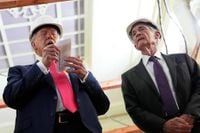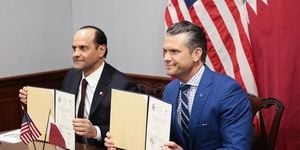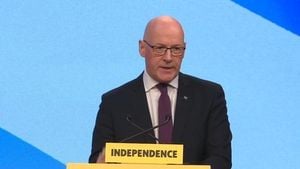All eyes are on Jackson Hole, Wyoming, this Friday as Federal Reserve Chair Jerome Powell prepares to deliver what is widely expected to be his final keynote address at the central bank’s storied annual economic symposium. The speech, scheduled for 10 a.m. Eastern Time on August 22, 2025, comes at a pivotal moment for the U.S. economy, the Fed’s future policy direction, and the institution’s fiercely guarded independence amid mounting political pressure.
For weeks, financial markets have been in a holding pattern, with investors and analysts alike awaiting Powell’s remarks for any hint about the direction of interest rates. The anticipation is palpable: as reported by Yahoo Finance and CNBC, investors have priced in with near-certainty a 0.25% rate cut at the Fed’s next policy meeting in September, assigning about 75% odds to that outcome as of Thursday afternoon. Yet, beneath the surface, there’s a swirl of debate within the Fed and a storm of political controversy threatening to overshadow the central bank’s usual focus on economic data.
Powell’s speech, titled “Economic Outlook and Framework Review,” is expected to address not only the immediate question of whether an interest rate cut is coming but also the broader, longer-term trajectory of the Fed’s policy framework. This framework, which is reviewed every five years, guides how the central bank balances its dual mandate: maintaining stable prices and maximizing employment. According to CNBC, the speech will likely be Powell’s opportunity to articulate changes to the Fed’s approach, including a possible rollback of its 2020 “flexible average inflation targeting” policy—a framework that allowed inflation to run above target if unemployment was high, especially among underrepresented groups.
“Much of his speech may try to provide a steady medium- to longer-term framing for policy strategy and inflation control,” noted Krishna Guha, head of global policy and central bank strategy at Evercore ISI, in comments to CNBC. “We do not expect Powell to decisively signal a September cut, but the speech should make it clear to markets that he is likely to support one.”
The context in which Powell will speak is anything but tranquil. The labor market has shown signs of strain, with the Bureau of Labor Statistics reporting meager job growth for July and even weaker gains for May and June. Still, several Fed policymakers—including Kansas City Fed President Jeffrey Schmid and Cleveland Fed President Beth Hammack—have described the labor market as “solid” and voiced skepticism about the need for a rate cut as soon as September. “There’s a lot of data we’re going to get between now and September, and I walk into every meeting with an open mind about what the right thing to do is,” Hammack told Yahoo Finance. “But with the data I have right now, and with the information I have, if the meeting was tomorrow, I would not see a case for reducing interest rates.”
Only a handful of Fed officials, such as Governors Michelle Bowman and Chris Waller, have openly advocated for a September rate cut. As Goldman Sachs economist David Mericle pointed out in a note cited by CNBC, “We suspect that most FOMC participants who have expressed mixed feelings about cutting in September will be willing to support a cut if Powell pushes for one, but that he will think it more reasonable to make that case to them closer to the meeting with more data in hand.”
Meanwhile, political pressure on the Fed has reached a fever pitch. President Donald Trump has kept up a steady barrage of criticism, frequently calling for lower interest rates and, more recently, targeting Fed Governor Lisa Cook over allegations regarding two federally backed mortgage loans. The Financial Times reported that the Department of Justice sent Powell a letter urging him to remove Cook from her post, a move Trump has also demanded. Trump has taken to calling Powell “Too Late” for not cutting rates earlier in the year and has openly questioned the Fed’s decisions on monetary policy.
Powell, for his part, has consistently defended the central bank’s independence. “I think that having an independent central bank has been an institutional arrangement that has served the public well,” he said last month, as reported by Yahoo Finance. “And as long as it serves the public well, it should continue and be respected.”
This theme of independence is expected to loom large in Powell’s Jackson Hole remarks. “He’s done a good job in terms of keeping the Fed’s independence, ignoring the noise and some of the questions he gets, and keeping it focused on the data dependency and the Fed’s dual mandate,” said Michael Arone, chief investment strategist at State Street Global Advisors, in an interview with CNBC. Dan North, senior economist at Allianz Trade North America, added, “He’s going to take a jab and talk about Fed independence, because what does he have to lose really at this point?”
But beyond the politics and the looming rate decision, Powell’s speech could also mark a significant shift in the Fed’s long-term policy stance. According to Matthew Luzzetti, chief U.S. economist at Deutsche Bank, the Fed is likely to signal a return to a more preemptive approach to inflation, moving away from the 2020 framework that permitted inflation to run above target. “While the adoption of the new framework in 2020 was not the primary factor behind the Fed’s delay and the substantial inflation overshoot, it contributed to this outcome,” Luzzetti said in a note cited by CNBC. “For this reason, we expect Powell’s speech in Jackson Hole to highlight changes to the Fed’s statement on longer-run goals that will reflect this reality. Specifically, we expect the speech to call for rolling back the 2020 modifications and restoring a primary role for preemption.”
Markets are bracing for one of three scenarios: Powell could signal a more hawkish path, disappointing those expecting rate cuts and potentially sending stocks lower; he could be more dovish than expected, spurring a rally; or he could simply confirm the widely anticipated cuts, which might result in a muted market response or even a “sell the news” dynamic. As Business Insider noted, “The market is still largely priced to perfection, and within shouting distance of record highs. That leaves it vulnerable to any recalibration in rate-cut expectations.”
With the current federal funds rate at 4.25% to 4.50%, and Treasury Secretary Scott Bessent suggesting the Fed consider a 0.50% cut in September, the stakes for Powell’s final Jackson Hole address could hardly be higher. Investors, policymakers, and politicians will be listening closely—not just for what Powell says about September, but for the legacy he leaves at the helm of the world’s most influential central bank.
As the sun rises over the Wyoming mountains, the future of U.S. monetary policy—and the independence of the Federal Reserve—hangs in the balance, waiting for Powell’s final word.





